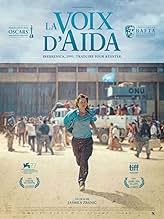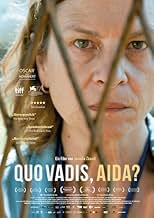CALIFICACIÓN DE IMDb
8.0/10
41 k
TU CALIFICACIÓN
Bosnia, 1995. Aida trabaja de traductora para la ONU en el pequeño pueblo de Srebrenica. Cuando el ejército serbio ocupa el pueblo, su familia está entre las miles de personas que buscan ref... Leer todoBosnia, 1995. Aida trabaja de traductora para la ONU en el pequeño pueblo de Srebrenica. Cuando el ejército serbio ocupa el pueblo, su familia está entre las miles de personas que buscan refugio en los campos de la ONU.Bosnia, 1995. Aida trabaja de traductora para la ONU en el pequeño pueblo de Srebrenica. Cuando el ejército serbio ocupa el pueblo, su familia está entre las miles de personas que buscan refugio en los campos de la ONU.
- Dirección
- Guionistas
- Elenco
- Nominado a 1 premio Óscar
- 40 premios ganados y 43 nominaciones en total
- Dirección
- Guionistas
- Todo el elenco y el equipo
- Producción, taquilla y más en IMDbPro
Resumen
Reviewers say 'Quo Vadis, Aida?' is a powerful, harrowing film about the Srebrenica massacre, praised for impactful storytelling and strong performances, especially Jasna Duricic as Aida. It critically examines the United Nations' failure and explores themes of war and survival. While lauded for emotional depth and historical significance, some criticize perceived inaccuracies and over-dramatization. It is considered an important, though challenging, film that highlights a significant historical event.
Opiniones destacadas
The main actress Jasna Djuricic deserves an Oscar. She gave such a great portrayal of a mother and a wife who's traying her best in the worst of situation. God forbid anyone finds themselves in that situation.
It was an ongoing debate in my family if we should watch the movie or not. My mother is from Srebrenica and we lost a huge part of our family and amongst them my grandpa. The wounds are still open and will be no matter how long time passes and my mother's memories are still as vivid as if it was yesterday. Having seen a few bad movies left us not wanting to se another one on that subject because directors ( particularly Jolie) tried in a way to romanticize the war even though there is NOTHING ROMANTIC about that war. A huge loss, suffering and vivid memories of near friend and family being killed and tortured is something that my mother lives with daily. So I watched the movie first and later we saw it together. And it hits you to the core. I think that Jasmila Zbanic accomplished something great by leaving out horror scenes and making us just imagine. Because no scene can ever compare with the reality of crime and horrors that happened. In a few segments of the movie we had to pause because they felt so real to my mother that she started to look for my grandpa in the scenes with people outside the UN zone hq. We highly recommend everyone to see this movie and to never forget about Srebrenica.
... because you never learn! The despicable, diabolical and disgusting events from Srebrenica, replayed many times before, currently playing out in several countries now, and quite probably for the foreseeable future while we continue to turn a blind eye, ignore, disengage or perhaps don't care. Jasna Djuricic as Aida, immense!
This is about events around the Srebrenica massacre in 1995. The UN promised that this would be a safe zone, but doesn't back up its ultimatums with action, leaving the small contingent of UN peacekeepers helpless in the face of stronger Serbian forces, who step-by-step get bolder, take over the town, and eventually the civilians seeking safety at the UN base.
I saw this as a digital screening of the Toronto International Film Festival, with writer / director Q+A. The writer put together the story based on actual transcripts, together with survivor stories. Many were composited into the main character Aida. Aida is a translator for the UN troops, and she also tries to keep safe her husband and 2 teenaged sons,. Thus she could move between the "defenders" and the defended, and tell the stories of both.
The characters are well-played and believable, and there are little touches that are illuminating: some flashbacks to pre-war life, a reference to neighbors turning against neighbors, etc. My one complaint is that, as a composite, some events seem to happen too quickly.
I saw this as a digital screening of the Toronto International Film Festival, with writer / director Q+A. The writer put together the story based on actual transcripts, together with survivor stories. Many were composited into the main character Aida. Aida is a translator for the UN troops, and she also tries to keep safe her husband and 2 teenaged sons,. Thus she could move between the "defenders" and the defended, and tell the stories of both.
The characters are well-played and believable, and there are little touches that are illuminating: some flashbacks to pre-war life, a reference to neighbors turning against neighbors, etc. My one complaint is that, as a composite, some events seem to happen too quickly.
The Bosnian entry for the Best International Feature Academy Award, "Quo Vadis, Aida?" is better than the odds-on favorite to actually win the Oscar, "Druk" (a.ka. "Another Round," 2020), being that it's actually about something that matters and is emotionally devastating--so much so that the eponymous Aida literally begs to make a Sophie's Choice at one point. The protagonists in both are teachers, and neither one ultimately affects any real change, but one is living history while the other rambles to high-schoolers about his famous favorite fellow drunkards. Both pictures are alienating: this one forcing us to witness the horrific Srebrenica massacre that we're unable to alter, and the other makes one feel like the designated driver to a bunch of binge-drinking dolts whining about their so-called mid-life crises. As opposed to waiting impatiently to drive the inebriated teachers home, however, "Quo Vadis, Aida?" does well to pull the spectator into the chaos. There's nary a dull moment in following Aida (as played rivetingly well by Jasna Duricic--seriously, Academy, you missed a nominee) around a makeshift UN refugee camp as she frantically tries to save the lives of her husband and two sons from the approaching slaughter by Ratko Mladic's Bosnian Serb Army and as the United Nations and their so-called, shorts-wearing peace keepers impotently stand by and refuse to help.
I want to note, too, that Aida being a translator, or interpreter, as the case may be (that "piano player" as "messenger" part early on, e.g.), makes for an interesting dynamic in the subtitling of the picture, among other things--much of it disregarded as unnecessary because of it. There's actually a good deal of English here beside other languages. Another good reason for the Oscar category name change from "Foreign Language Film" to "International Feature."
Additionally, amid all that, writer-director Jasmila Zbanic and company also do something reflexively interesting cinematically. While the real war is nothing more than a one-sided genocide slaughtering Bosniak Muslim males, there's another battle here for the cinematic control of the narrative. On one side, there's Mladic with the cameraman he continually tells what to shoot, and who in return reassures the would-be convicted war criminal that he'll fix his inane monotony with montage. We never see that film here, though--only its making from the outside, where its propagandistic lies are all the more apparent. And, on the other side, we have the faces of the people in the outer, film proper that is "Quo Vadis, Aida?" We see this in intermittent series of return gazes--of people looking directly, or close to, at the camera and, thus, us, the audience. They're the victims of the genocide within the narrative and, as the case may be, interpreting the real tragedy onto the screen, but through these return gazes, seize control of the narrative. This is their movie.
I want to note, too, that Aida being a translator, or interpreter, as the case may be (that "piano player" as "messenger" part early on, e.g.), makes for an interesting dynamic in the subtitling of the picture, among other things--much of it disregarded as unnecessary because of it. There's actually a good deal of English here beside other languages. Another good reason for the Oscar category name change from "Foreign Language Film" to "International Feature."
Additionally, amid all that, writer-director Jasmila Zbanic and company also do something reflexively interesting cinematically. While the real war is nothing more than a one-sided genocide slaughtering Bosniak Muslim males, there's another battle here for the cinematic control of the narrative. On one side, there's Mladic with the cameraman he continually tells what to shoot, and who in return reassures the would-be convicted war criminal that he'll fix his inane monotony with montage. We never see that film here, though--only its making from the outside, where its propagandistic lies are all the more apparent. And, on the other side, we have the faces of the people in the outer, film proper that is "Quo Vadis, Aida?" We see this in intermittent series of return gazes--of people looking directly, or close to, at the camera and, thus, us, the audience. They're the victims of the genocide within the narrative and, as the case may be, interpreting the real tragedy onto the screen, but through these return gazes, seize control of the narrative. This is their movie.
¿Sabías que…?
- TriviaJasna Djuricic, who plays the main role, is the wife of Boris Isakovic, who plays general Mladic. They often work together in film and theater, but in this film they don't share any scenes.
- Citas
Aida Selmanagic: We are on the list!
- ConexionesFeatured in Los 93 Premios de la Academia (2021)
Selecciones populares
Inicia sesión para calificar y agrega a la lista de videos para obtener recomendaciones personalizadas
- How long is Quo Vadis, Aida??Con tecnología de Alexa
Detalles
- Fecha de lanzamiento
- Países de origen
- Sitios oficiales
- Idiomas
- También se conoce como
- Where are you going, Aida?
- Locaciones de filmación
- Productoras
- Ver más créditos de la compañía en IMDbPro
Taquilla
- Presupuesto
- EUR 4,500,000 (estimado)
- Total a nivel mundial
- USD 813,253
- Tiempo de ejecución1 hora 41 minutos
- Color
- Mezcla de sonido
- Relación de aspecto
- 1.85 : 1
Contribuir a esta página
Sugiere una edición o agrega el contenido que falta

Principales brechas de datos
By what name was Quo Vadis, Aida? (2020) officially released in India in Hindi?
Responda

![Trailer [OV]](https://m.media-amazon.com/images/M/MV5BNjFiN2EzNDItMzBiNy00YjI4LTkwM2YtN2YxYzcwYmYzYjIxXkEyXkFqcGdeQXRyYW5zY29kZS13b3JrZmxvdw@@._V1_QL75_UX500_CR0)






























